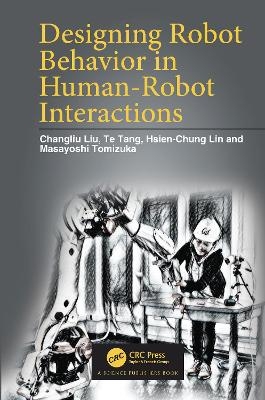
Designing Robot Behavior in Human-Robot Interactions
CRC Press (Verlag)
978-0-367-77657-2 (ISBN)
In this book, we have set up a unified analytical framework for various human-robot systems, which involve peer-peer interactions (either space-sharing or time-sharing) or hierarchical interactions. A methodology in designing the robot behavior through control, planning, decision and learning is proposed. In particular, the following topics are discussed in-depth: safety during human-robot interactions, efficiency in real-time robot motion planning, imitation of human behaviors from demonstration, dexterity of robots to adapt to different environments and tasks, cooperation among robots and humans with conflict resolution. These methods are applied in various scenarios, such as human-robot collaborative assembly, robot skill learning from human demonstration, interaction between autonomous and human-driven vehicles, etc.
Key Features:
Proposes a unified framework to model and analyze human-robot interactions under different modes of interactions.
Systematically discusses the control, decision and learning algorithms to enable robots to interact safely with humans in a variety of applications.
Presents numerous experimental studies with both industrial collaborative robot arms and autonomous vehicles.
Changliu Liu is an assistant professor in the Robotics Institute at Carnegie Mellon University, where she leads the Intelligent Control Lab. She received her PhD degree from University of California at Berkeley in 2017. Her research interests include: robotics and human-robot interactions, control and motion planning, optimization and optimal control, multi-agent system and game theory, design and verification of safe intelligent systems. Te Tang received his PhD degree from University of California at Berkeley in 2018. He joined FANUC America Corporation in 2018, and he is currently a researcher at FANUC Advanced Research Laboratory. His research interests include robotics, learning from demonstration, computer vision and their industrial applications. Hsien-Chung Lin is a research engineer in FANUC Advanced Research Laboratory at FANUC America Corporation. Prior to joining FANUC, he received his Ph.D. degree from University of California at Berkeley in 2018. His research interests cover robotics, optimal control, human-robot interaction, learning from demonstration and motion planning. Masayoshi Tomizuka received his PhD degree from MIT in 1974. In 1974, he joined the Mechanical Engineering Department of the University of California, Berkeley, where he currently is Cheryl and John Neerhout, Jr., Distinguished Professor. His research interests are control theory and its applications to mechatronic systems such as robots. He is a Life Fellow of ASME and IEEE, and a Fellow of IFAC. He was awarded the Rufus Oldenburger Medal (2002) and the Richard Bellman Control Heritage Award (2018).
SECTION I INTRODUCTION. Introduction. Framework. SECTION II THEORY. Safety during Human-Robot Interactions. Efficiency in Real-Time Motion Planning. Imitation: Mimicking Human Behavior. Dexterity: Analogy Learning to Expand Robot Skill Sets. Cooperation: Conflict Resolution during Interactions. SECTION III APPLICATIONS. Human-Robot Co-existence: Space-Sharing Interactions. Robot Learning from Human: Hierarchical Interactions. Human-Robot Collaboration: Time-Sharing Interactions. SECTION IV CONCLUSION. Vision for Future Robotics and Human-Robot Interactions. References. Index
| Erscheinungsdatum | 06.04.2021 |
|---|---|
| Verlagsort | London |
| Sprache | englisch |
| Maße | 156 x 234 mm |
| Gewicht | 453 g |
| Themenwelt | Informatik ► Software Entwicklung ► User Interfaces (HCI) |
| Informatik ► Theorie / Studium ► Künstliche Intelligenz / Robotik | |
| ISBN-10 | 0-367-77657-X / 036777657X |
| ISBN-13 | 978-0-367-77657-2 / 9780367776572 |
| Zustand | Neuware |
| Haben Sie eine Frage zum Produkt? |
aus dem Bereich


